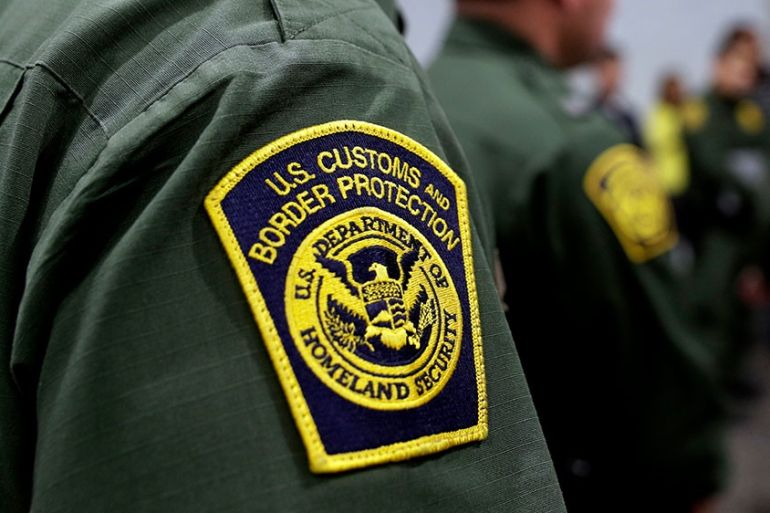US can soon start sending people seeking asylum to Honduras
Critics slam new US-Honduras deal, which was released the same day the US indicted a Honduran ex-national police chief.

The administration of US President Donald Trump has finalised a controversial agreement with Honduras that would allow some people seeking asylum in the United States to be sent to the Central American country instead.
The agreement is similar to one with Guatemala and is part of the administration’s effort to reduce the flow of migrants across the southwest border by making it harder to gain entry to the US with an asylum claim. Critics have slammed the deals, saying they violate US obligations under international law on asylum.
Keep reading
list of 3 itemsGuatemala: US deportations driving up country’s coronavirus cases
Guatemala suspends all deportation flights from US over COVID-19
The text of the agreement with Honduras was released Thursday, a day before it is published in the Federal Register and takes effect.
The US is already expelling most people it encounters along the US-Mexico border under an emergency public health order signed by Trump last month in response to the coronavirus outbreak. That order was renewed for 30 days and is set to expire next month.
Critics say both the new agreement and the earlier one with Guatemala – the subject of a legal challenge – represent a retreat by the US from its obligations under international law to provide a sanctuary to people seeking refuge from persecution and high rates of violence.
Honduras had a murder rate of 44 per 100,000 inhabitants in 2019 – one of the highest in the world
Neither Honduras nor Guatemala has the capacity to accept and resettle refugees, so people will likely just return eventually to whatever danger they fled in their home countries, said Yael Schacher, senior US advocate for Refugees International.
“The US is indirectly sending people back to face persecution,” Schacher said.
Aaron Reichlin-Melnick, a lawyer and policy counsel with the American Immigration Council, said on Twitter that with the Honduras deal in place, “asylum at the southern border is effectively gone”.
“Honduras and Guatemala are not ‘safe third countries’ for asylum seekers fleeing harms in neighboring countries, he added. “The only thing that can stop these illegal agreements is a court case that’s slow you wending [sic] its way through the system now – and the November election.”
Honduras and Guatemala are not “safe third countries” for asylum seekers fleeing harms in neighboring countries.
The only thing that can stop these illegal agreements is a court case that’s slow you wending its way through the system now—and the November election.
— Aaron Reichlin-Melnick (@ReichlinMelnick) April 30, 2020
Under the agreement reached last year, the US sends asylum seekers from El Salvador and Honduras to Guatemala. The majority of those sent as part of that deal have chosen to return back to their country instead of seeking asylum in Guatemala.
It is not yet clear how the new agreement would work. Neither the version released by the US nor the one put out earlier by the Honduran government specifically says who could be sent to Honduras.
But officials have previously said that the government of Honduras had agreed to accept asylum seekers from Guatemala, El Salvador, Mexico, Nicaragua and Brazil.
The US Department of Homeland Security and US Customs and Border Protection did not immediately comment on the agreement.
US indictment of ex-Honduran police chief
Release of the agreement came on the same day that federal prosecutors in New York announced that the former chief of the Honduran National Police has been charged there with drug trafficking and weapons offences.
Prosecutors said that Juan Carlos Bonilla Valladares, also known as “El Tigre,” oversaw the multi-tonne shipments of cocaine bound for the US on behalf of Honduran President Juan Orlando Hernandez and his brother, former Congressman Juan Antonio “Tony” Hernandez, who was found guilty of US drug trafficking charges last year.
Speaking to Honduran media, Bonilla, who is not in US custody, said he is not a “villain” and he could defend himself “anywhere” against the accusations, which he said were false.
Schacher, Reichlin-Melnick and other advocates cited that as evidence that the troubled Central American country is ill-equipped to accept people fleeing from persecution elsewhere in the world.
“Honduras has failed miserably to protect the lives and human rights of its own citizens,” said Eleanor Acer, director of the Refugee Protection programme at Human Rights First. “There is simply no credible reason to believe that Honduras will actually protect refugees seeking asylum from other countries.”
According to Syracuse University’s Transactional Records Access Clearinghouse, US immigration judges decided 67,406 asylum cases in the 2019 budget year, a record and nearly two and a half times the number decided five years ago. Most of those arriving at the southwest border last year were from Central America’s “Northern Triangle” countries – Guatemala, Honduras and El Salvador.
Acting Homeland Security Secretary Chad Wolf and others in the administration have argued that fewer people will make the dangerous journey to the US if they can get asylum in other countries in the region.